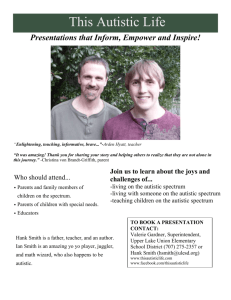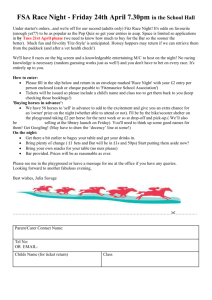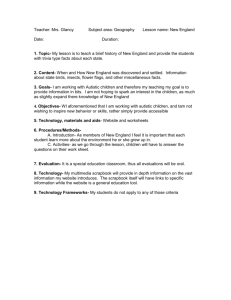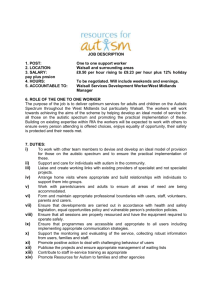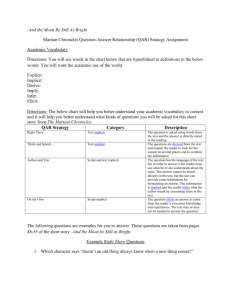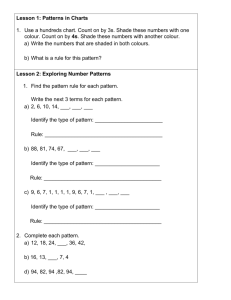Understanding ASD
advertisement
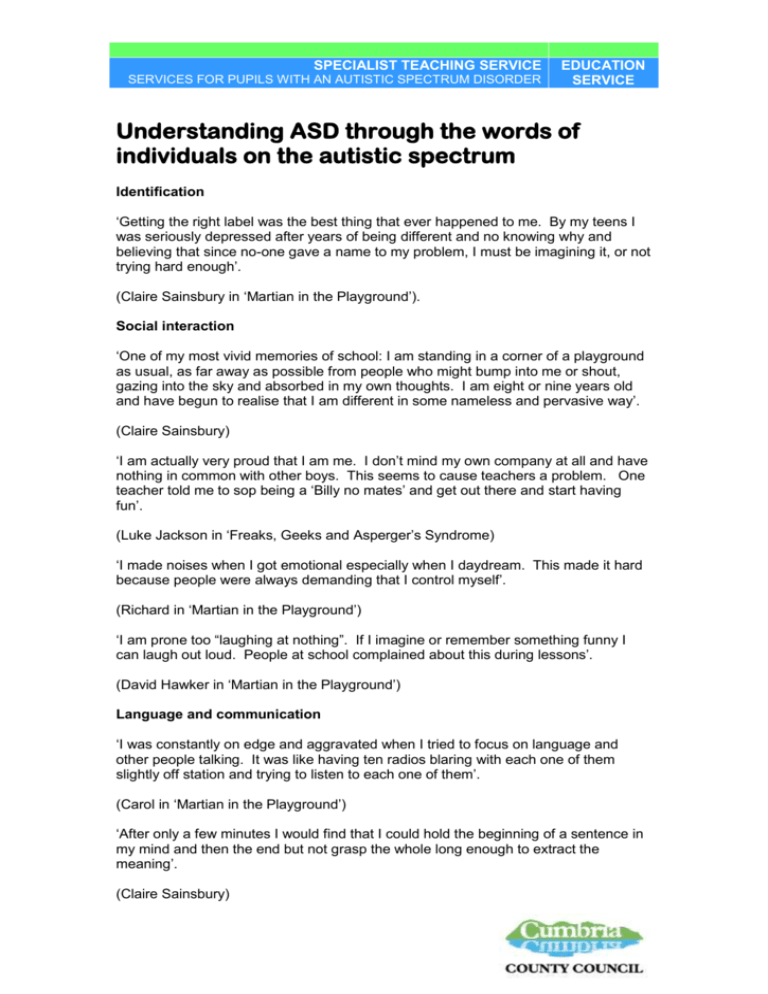
SPECIALIST TEACHING SERVICE SERVICES FOR PUPILS WITH AN AUTISTIC SPECTRUM DISORDER EDUCATION SERVICE Understanding ASD through the words of individuals on the autistic spectrum Identification ‘Getting the right label was the best thing that ever happened to me. By my teens I was seriously depressed after years of being different and no knowing why and believing that since no-one gave a name to my problem, I must be imagining it, or not trying hard enough’. (Claire Sainsbury in ‘Martian in the Playground’). Social interaction ‘One of my most vivid memories of school: I am standing in a corner of a playground as usual, as far away as possible from people who might bump into me or shout, gazing into the sky and absorbed in my own thoughts. I am eight or nine years old and have begun to realise that I am different in some nameless and pervasive way’. (Claire Sainsbury) ‘I am actually very proud that I am me. I don’t mind my own company at all and have nothing in common with other boys. This seems to cause teachers a problem. One teacher told me to sop being a ‘Billy no mates’ and get out there and start having fun’. (Luke Jackson in ‘Freaks, Geeks and Asperger’s Syndrome) ‘I made noises when I got emotional especially when I daydream. This made it hard because people were always demanding that I control myself’. (Richard in ‘Martian in the Playground’) ‘I am prone too “laughing at nothing”. If I imagine or remember something funny I can laugh out loud. People at school complained about this during lessons’. (David Hawker in ‘Martian in the Playground’) Language and communication ‘I was constantly on edge and aggravated when I tried to focus on language and other people talking. It was like having ten radios blaring with each one of them slightly off station and trying to listen to each one of them’. (Carol in ‘Martian in the Playground’) ‘After only a few minutes I would find that I could hold the beginning of a sentence in my mind and then the end but not grasp the whole long enough to extract the meaning’. (Claire Sainsbury) SPECIALIST TEACHING SERVICE SERVICES FOR PUPILS WITH AN AUTISTIC SPECTRUM DISORDER EDUCATION SERVICE Sensory Responses ‘For me, three things (hearing, smell, touch) are painfully overwhelming, non-existent or just confusing, but when an experience or emotion is attached to some form of connecting stimuli, such as colour and fragrance, I am more likely to relate to it…I find colour simply fascinating and it stirs up all sorts of feelings in me. The stronger and brighter the colour, the more stirred up I become’. (Lawson, 1998) ‘People everywhere, talking, wearing bright colours. The talking is like the pounding of horses’ hooves. The bright colours are blinding, the talking hurts my ears, the bright colours hurt my eyes. Oh why can’t people be quiet and wear dark colours’. (Professor Temple Grandin) Interests and Obsessions ‘I am sure that if a parent went to a doctor and said their teenager son wouldn’t shut up about football they would laugh and tell them it was perfectly normal’. ‘When people hear the word ‘obsession’ they automatically think that it is something negative or bad. That’s why I prefer the term favourite topic subject. If a fascination is channelled in the right way it can be put to good use’. (Luke Jackson) ‘I find it really hard to motivate myself to do things which don’t come out of a genuine interest. If they do there’s no limit to my motivation and effort’. (Claire Sainsbury) On Teacher and Parents ‘Teachers and students need to understand that an autistic child is not merely a child that needs more discipline. They need to know what autism is and isn’t. They also need to understand that they will not be able to make this child non-autistic’. (Carol in ‘Martian in the Playground’) ‘The best advice I would give to parents that have found out that their child has AS is just to accept them as they are. Preconceived ideas are never a good thing. To be on the autistic spectrum is not the same as being on death row – it’s not a death sentence, it is not terminal, it is merely a name for a lifelong set of behaviours’. (Luke Jackson)
